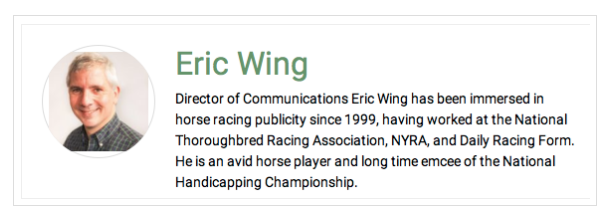
We’re all familiar with one of the most frustrating feelings in mythical-money, win-place contest play. You do your handicapping. You identify a 15-1 shot you think has a real chance of winning. You pull the trigger on the play, then start to get excited as, under no encouragement, he starts moving past shorter price horses down the backstretch.
He turns for home and has just one horse left to run down. He pulls up alongside, but the leader digs in and they race as a team to the wire.
You lose the head bob.
If you’re like most people, your first emotion is disappointment—and that’s probably being kind, given the way the race unfolded and your flirtation with a tourney-changing hit.
This happened to McKay Smith twice in a row on the final day of last month’s Horseplayer World Series. He was in about 70th place and needed a nice victory to move into contention, but it just wasn’t happening for him. I was sitting next to him, and my entry was dead in the water, so I was in full root-for-McKay mode. I muttered an expletive after his first near-miss and gave a single, yet forceful pound to the ballroom table after the second.
McKay left the histrionics to me, but he was no less frustrated—especially when the exact same thing happened on his next play in a Laurel claimer where it seemed we were the only people in the room paying attention to the race.
While I searched under dishes and napkins for a drink ticket, McKay started scribbling on a piece of scrap paper before the Laurel race went official. “If I can get $15.00 to place here, I think it might move me into the top 15,” he said.
He did, and it did.
A couple of winners later—including one by longshot Quip in the Tampa Bay Derby—McKay was all the way up to second place. Ultimately, he didn’t catch winner Bob Montgomery, but the $86,000 return was way better than the minimum $860 cash he was looking at just a few hours earlier.
It didn’t seem like it at the time, but in hindsight, those three place collections, worth a total of about $57 per $2, were gigantic—both for their literal value and the positive feelings they provided as he slowly but surely moved up the leaderboard.
From a psychological standpoint, not all second-place finishes are created equal. A straight-to-the-lead horse who gets nailed at the wire feels like a loss, while a laggard who clunks up for second—10 lengths behind the winner—feels like a gift from the Gods.
With place horses, though, it’s often not how, but how many, This has been seen many times over the past two weeks at HorseTourneys.
On March 31, Michael Gotkin won the year’s first Breeders’ Cup Betting Challenge qualifier.

He sealed his victory by hitting three straight place horses—worth $13.20, $18.80 and $7.20, respectively—late in the tourney.
It was a similar scenario for Brett Wiener when he won the next day’s BCBC qualifier.

Wiener moved himself into strong early contention with three winners. What put him over the top? His three cashes that followed—all runners up.
Jeff Higgins won last Sunday’s Saratoga Challenge qualifier despite picking just two winners out of 12 races.

He had four place horses, though, and those are the ones—every bit as much as the other two—that are sending Jeff to the Spa.
If John Vogel is reading this, he may be thinking, “Two winners? What a luxury!”

Vogel punched his ticket to the NHC on April 1 even though he picked just a single winner. Among his four place payoffs were a $16.00 return on longshot Hal’s Buddy in the last contest race. That’s the one that got Vogel into the end zone.
I’m confident Brian Herrity is a believer in the power of the place. On March 31 he played two entries in a Keeneland Grade 1 Gamble qualifier and one of them had the winners of the first two races—at juicy win mutuels of $26.20 and $31.60.

The only problem for Herrity is that his entry with those two early longshots was “up the track” at the end of this tourney. What won him the $3,500 Keeneland package in this tight finish was his “Entry 2″—the one with two later-in-the-day winners plus five runners up.
Place horses don’t do much to get the blood pumping or to evoke high-fives, but—like special teams play in football—they certainly can have an effect on the outcome of the game.
So the next time your contest horse runs second, don’t swear…don’t pound the table. Only stupid people do that! Instead, try to remember the old adage that half a loaf is better than no loaf at all.
You seldom know or appreciate it at the time, but sometimes that half a loaf is all you ever really needed.
